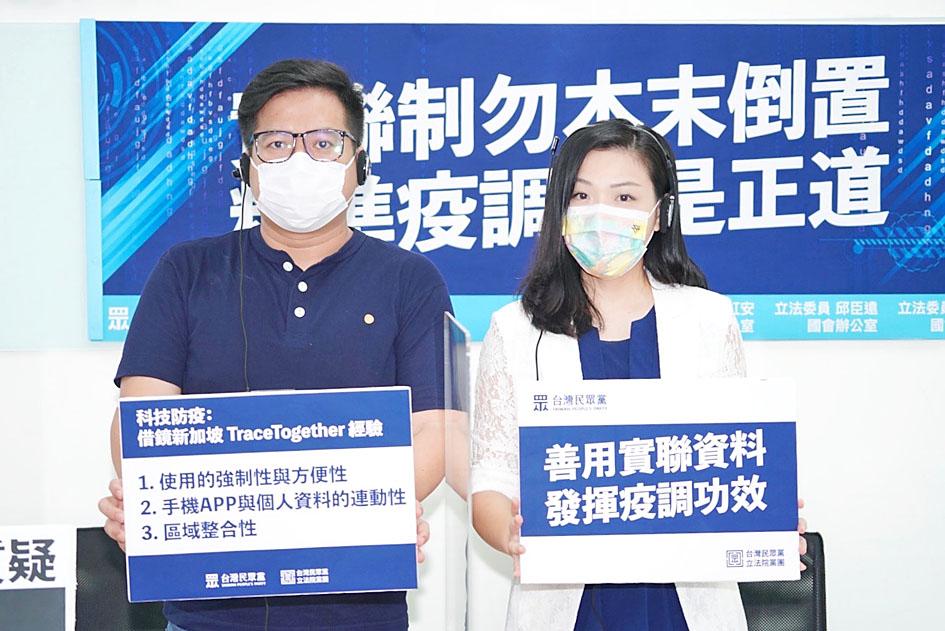The nation’s COVID-19 tracking system is flawed and incoherent, and the Executive Yuan does not fulfill its oversight duties, Taiwan People’s Party (TPP) Legislator Ann Kao (高虹安) said yesterday.
The TPP cited a complaint from a person surnamed Wang (王) who said that cloud documents created by National Chung Hsing University in Taichung are used in his community for registration and tracking.
However, completed forms were not forwarded to the government, while the data have to be deleted after 28 days, the TPP said.

Photo courtesy of the Taiwan People’s Party
The community learned about this when asking the university and the Centers of Disease Control’s 1922 hotline, it added.
The gathering of data is useless if the government does not receive it, Kao said, calling on the government to create a form for universal use to track the spread of COVID-19 in Taiwan.
The Executive Yuan’s data collection efforts lack a general direction, Kao said, adding that the government should as soon as possible implement a centralized system that allows for real-time data collection and analysis, and has clear-cut rules on the gathering, use and disposal of personal data.
A good example for such a system is Singapore, which uses the TraceTogether program, a cellphone app linked with a physical token for those who prefer not to use mobile phones, Kao said.
The app offers daily updates on the movements of the city-state’s confirmed COVID-19 cases over the previous two weeks, including alerts for those who might have had contact with an infected person, she said.
The system automatically removes data after 25 days, Kao said, urging the government to implement a similar system.
A new system to track the spread of COVID-19 should take into account that the virus cannot be contained regionally and should integrate data gathered nationwide, she added.
TPP Legislator Chang Chyi-lu (張其祿) said that the Ministry of Justice should draft legislative amendments based on the Ministry of Health and Welfare’s standard that COVID-19 prevention data cannot be used for other purposes.
The amendments should ensure that information collected through the 1922 hotline, and the SMS registration and tracking program do not fall under the Communication Security and Surveillance Act (通訊保障及監察法), he said.
The National Police Agency should also be notified that data collected for disease prevention should be off-limits for investigation purposes, Chang said, adding that this would help uphold people’s right to privacy.

Eight restaurants in Taiwan yesterday secured a one-star rating from the Michelin Guide Taiwan for the first time, while three one-star restaurants from last year’s edition were promoted to two stars. Forty-three restaurants were awarded one star this year, including 34 in Taipei, five in Taichung and four in Kaohsiung. Hosu (好嶼), Chuan Ya (川雅), Sushi Kajin (鮨嘉仁), aMaze (心宴), La Vie by Thomas Buhner, Yuan Yi (元一) and Frassi in Taipei and Front House (方蒔) in Kaohsiung received a one-star rating for the first time. Hosu is known for innovative Taiwanese dishes, while Chuan Ya serves Sichuan cuisine and aMaze specializes

STATS: Taiwan’s average life expectancy of 80.77 years was lower than that of Japan, Singapore and South Korea, but higher than in China, Malaysia and Indonesia Taiwan’s average life expectancy last year increased to 80.77 years, but was still not back to its pre-COVID-19 pandemic peak of 81.32 years in 2020, the Ministry of the Interior said yesterday. The average life expectancy last year increased the 0.54 years from 2023, the ministry said in a statement. For men and women, the average life expectancy last year was 77.42 years and 84.30 years respectively, up 0.48 years and 0.56 years from the previous year. Taiwan’s average life expectancy peaked at 81.32 years in 2020, as the nation was relatively unaffected by the pandemic that year. The metric

Taiwan High Speed Rail Corp. (THSRC) plans to ease strained capacity during peak hours by introducing new fare rules restricting passengers traveling without reserved seats in 2026, company Chairman Shih Che (史哲) said Wednesday. THSRC needs to tackle its capacity issue because there have been several occasions where passengers holding tickets with reserved seats did not make it onto their train in stations packed with individuals traveling without a reserved seat, Shih told reporters in a joint interview in Taipei. Non-reserved seats allow travelers maximum flexibility, but it has led to issues relating to quality of service and safety concerns, especially during

A magnitude 5.1 earthquake struck Chiayi County at 4:37pm today, the Central Weather Administration (CWA) said. The hypocenter was 36.3km southeast of Chiayi County Hall at a depth of 10.4km, CWA data showed. There were no immediate reports of damage resulting from the quake. The intensity of the quake, which gauges the actual effect of a seismic event, measured 4 in Chiayi County, Tainan and Kaohsiung on Taiwan's seven-tier intensity scale, the data showed. The quake had an intensity of 3 in Chiayi City and Yunlin County, while it was measured as 2 in Pingtung, Taitung, Hualien, Changhua, Nantou and Penghu counties, the data